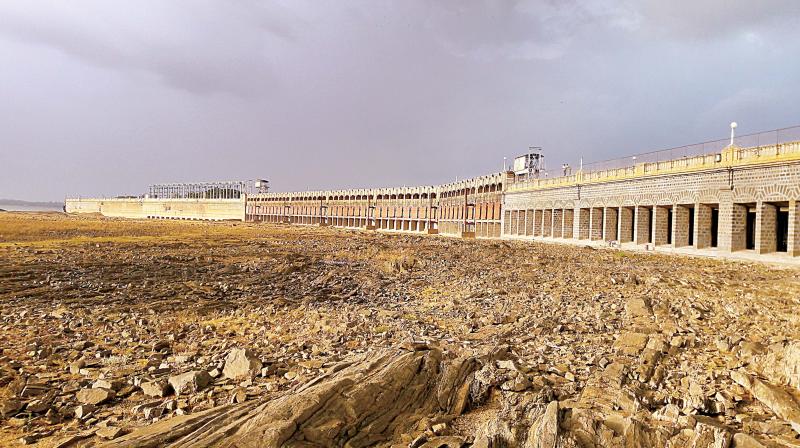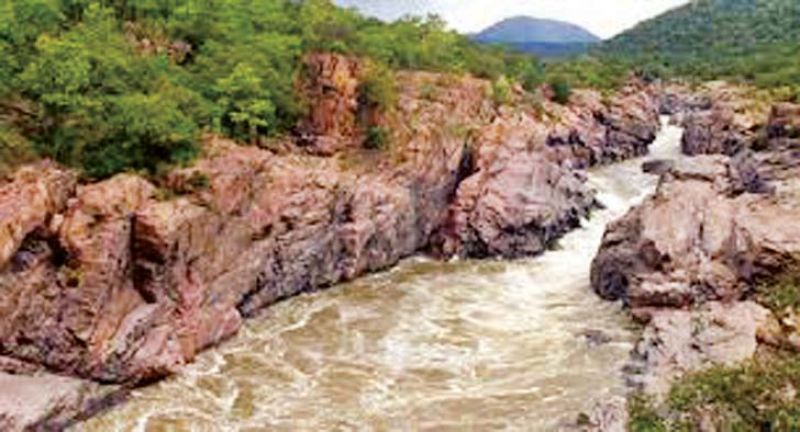Bengaluru: Dams at dead storage, dry days ahead
Pumping water will cost the government Rs 40 crore, an expensive and inefficient solution.

Bengaluru is in for a long, dry summer. The situation is dire, even in the run up to the hottest months of the year, as the city is already being forced to draw its drinking water from dead storage in the Cauvery dam. Pumping water will cost the government Rs 40 crore, an expensive and inefficient solution, reports Team DC.
It’s February and the city is already getting hot. While most Bengalureans are not complaining of water shortage yet, their days of comfort may be numbered as the outskirts of the city are already facing the heat with water supply here far more intermittent now than before.
With Bengaluru drawing most of the 1.5 TMC ft of water it needs every month from the Cauvery reservoirs, it is looking at a bleak summer as the poor monsoon has left the KRS and Kabini reservoirs with only 7.9 TMC ft of water of which 4.2 TMC ft is dead storage.
Seeing the writing on the wall and anticipating a water crisis in coming weeks, the BWSSB is now preparing to dip into the dead storage of these dams to meet Bengalureans’ water requirements. While it has come up with a contingency plan at an estimated cost of Rs 40 crore to pump water from the dead storage in the Krishna Raja Sagar (KRS) dam to meet the city’s demand, former irrigation secretary and water expert, Captain Raja Rao warns this may not help avert a water crisis in the city.
"At present there is 5.9 TMC ft of water in the KRS and 2.3 TMC ft. in the Kabini reservoir. Although the dead storage of both dams is estimated at 4.2 TMC ft, there is bound to be silt upto 2 TMC feet, making only the rest of the water available for pumping to the city. And even this water will need extra purification as it will have a lot of impurities like silt and algae," he explains.
Also, with water from KRS and Kabini reservoirs being supplied to Mysuru, Mandya, Bannur, Ramanagar and other areas as well, by the time it reaches T K Halli to be purified and piped to Bengaluru, a lot of it may be lost in transmission and to evaporation, he points out. “For transmission over every square meter there is 4 to 6 mm evaporation loss,” he reveals.
But Capt. Rao believes the government should go it easy on farmers despite the water crisis looming in the city. Depriving them of water for their second crop without proper compensation could leave them in dire straits and cause more of them to attempt suicide, he warns.
As for the Supreme Court directing Karnataka to release Cauvery water to Tamil Nadu, despite its own shortage, he says it should have heard Karnataka's legal team on the drought in the state before giving its verdict.
Is desalination of sea water the answer?
The desalination project to provide drinking water to the coastal parts of Karnataka, cannot meet the needs of Bengaluru as it will cost hundreds of crores to transport water over such a distance, says former irrigation secretary, Captain Raja Rao. He suggests the city should instead treat its sewage and re-use it for purposes other than drinking.
“With the pressure on Cauvery water increasing every year due to the city’s swelling population, from where will the government get more fresh water for it? Recycling of water must be popularised and it must begin right from the seat of power, Vidhana Soudha,” he says. Welcoming the Mekedatu multipurpose project, Capt. Rao hopes the government will convince the Centre and the Supreme Court to give it their approval.
Situation grim but manageable, govt will pump in Rs 40 crore
Despite the depleting storage in the Cauvery reservoirs. the government assures there is no real reason for concern about the city’s water supply. "We are committed to providing drinking water to people till May. The water available in the four reservoirs of KRS, Kabini, Harangi and Hemavathi will be used judiciously over the next 90 days," said Water Resources Minister, M.B. Patil.
While admitting that the department was under tremendous pressure to meet the drinking water requirements of the city in view of the poor storage in all four reservoirs, he said it was pinning it hopes on the expected unseasonal rain in April-May to tide over the situation, which though "grim" was manageable.
“The failure of the monsoon over the last three years has aggravated the situation. Though the monsoon was initially promising last year, it later played truant with Karnataka and Tamil Nadu which depend mainly on the river Cauvery for irrigation and drinking water. We are praying 'Varuna' (rain god) will have mercy on Karnataka at least this year," he added.
The water scarcity has hit the farmers hardest as crops were grown over only two lakh hectares as against six lakh hectares in the Cauvery basin during the kharif season last year and no water was supplied to them during the rabi season. Crops worth crores of rupees were damaged for want of water.
Will Bengaluru be hit by a water crisis?
While water shortage has already gripped scores of villages in Mysuru, Mandya, parts of Chamarajanagar and Ramanagara, forcing the authorities to supply them water in tanks, officials in the water resources department say Bengaluru too may see a water shortage in coming weeks.
The city, which requires around 1.5 tmc ft of water every month mainly from the Cauvery river, has to share the storage in its reservoirs with Mysuru, Mandya, Maddur, Channapatna and Ramanagaram. Denying the towns and cities between Mysuru and Bengaluru of water could invite trouble, warns an officer, recalling that a few years ago, Mandya farmers had threatened to cut the drinking water line to Bengaluru in protest over the lack of water supply to save their standing crops.
Going by the officers, all four reservoirs have around 22 tmc ft of water, including dead storage. If the demand increases, the water resources department plans to dip into their dead storage and has set aside Rs 40 crore for the purpose, as it will require the use of heavy duty pumping equipment and water purification.
“We never saw this sort of a situation in the past. But things have changed over the last four years, making every drop of water precious, especially for Bengaluru. Supplying water every day may be difficult during peak summer in April and May. We need the co-operation of the people to tide over this difficult situation," an officer added.


